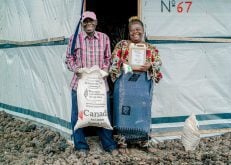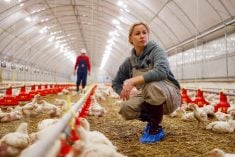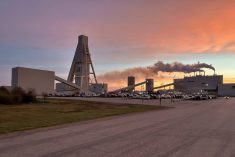When Ron Kotyshyn walked to the podium yesterday afternoon at Ag Days in Brandon, several producers in the crowd commented, “he is a real farmer.”
Neither of his predecessors, Stan Struthers or Rosann Wowchuk, were farmers.
Kotyshyn, a cattle farmer who used to run a herd of 250 cows near Ethelbert, Man., now operates a smaller cow-calf operation and rents out his grain land to his brothers
“I have about 40 cows,” the rookie MLA from Swan River told reporters following his speech.
“Five of them need hip replacements, like I had three years ago. So, unfortunately, age has got the best of them.”
Read Also

B.C. ostriches culled, CFIA confirms
Ostriches on an embattled Edgewood, B.C. farm have been culled after a prolonged legal battle, the Canadian Food Inspection Agency has confirmed.
Manitoba hasn’t had an agriculture minister who was a farmer since the NDP took power in 1999, partly because the majority of New Democrat MLAs are from Winnipeg.
Kotyshyn said being a farmer does offer a few advantages.
“I have a sense of comfort that I can relate to beef producers, for example, on the BSE crisis.”
However, he also said it wasn’t a problem that Struthers and Wowchuk weren’t farmers because they were born on farms.
Doug Chorney, president of Keystone Agricultural Producers, sees it differently.
“Having the experience of a real farmer around the cabinet table is going to be a big benefit for future decisions and planning,” he said.
“I’m looking forward to seeing his influence on the policies of government.”
Manitoba farmers, especially hog producers, have frequently said the NDP government unfairly blames farmers for environmental issues in Manitoba, such as nutrient buildup in Lake Winnipeg.
The government passed the Save Lake Winnipeg Act last summer, which bans the construction or expansion of hog barns unless producers install expensive technology such as anaerobic digesters to treat hog manure.
Brandon mayor Shari Decter-Hirst echoed the concerns of hog producers and industry representatives earlier this month when she said the legislation could jeopardize the supply of hogs for slaughter plants that employ nearly 3,000 people in Brandon and Neepawa.
Kotyshyn said Decter-Hirst’s comments are valid, but the government needs to represent the interests of all Manitobans.
“We definitely want to get the hog industry back into what it was, historically, but we have some environmental issues we need to address,” he said.
He also disagreed that the government has lost the confidence of hog farmers.
“Not at all. I think we do (have their confidence, but) … we need to work with the producers to make it (environmental policy) appropriate for all people in the province of Manitoba.”















